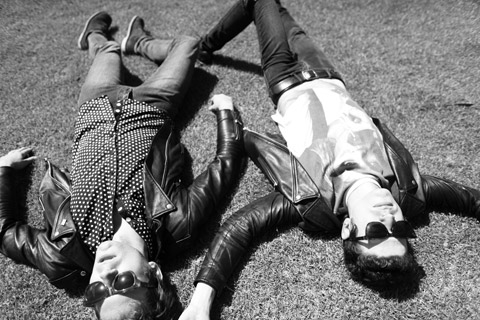
LOOK UP! "It gets pretty frustrating to have your complete artistic output summed up in 'shoegaze' or this or that," says Crocodiles' Brandon Welchez (right, with Charles Rowell). |
There are loads of bands out there that defy, don't want, and often downright despise categorization. Since forming Crocodiles four years ago, singer Brandon Welchez and guitarist Charles Rowell have been dodging "Jesus and Mary Chain sound-alikes" and "Echo & the Bunnymen wannabes" dispatches from crusty critics too lazy to dig deeper than their own well-worn copies of Psychocandy and Ocean Rain for frames of reference."It gets pretty frustrating to have your complete artistic output summed up in 'shoegaze' or this or that," Welchez tells me over the phone during a Sunday afternoon chat from the outfit's native San Diego. "We don't want to be part of any kind of scene or anything like that; we just want to be ourselves and do our own thing."
Certainly parallels can be drawn to more familiar acts across the noise-pop spectrum when listening to Crocodiles' first-rate debut Summer of Hate and 2010's slicker and more melodic Sleep Forever off Fat Possum. "I Wanna Kill," off the former, is particularly reverential to early JAMC, but on the whole, there's a dirty distortion and adventurous element that has degrees of edginess countering the safety of simply aping the past.
"Punk was the first thing that Charles and I go into, so that will always inform what we do in some degree or another, because it's such an early influence," Welchez says. "Same with the '60s; our parents are of the generation where they would always have the radio on, and there is just so much good pop music from the '60s."
That decade produced perhaps Crocodiles' biggest influence, the Velvet Underground. "There's one common current that goes through all of Lou Reed's songwriting, and that's simplicity — trying to be literate lyrically, but marrying it to three-chord music. Some of the stuff he's done is so powerful, and then when you learn it you're like, 'Oh yeah, it's also so simple.' And that's really inspiring because it's just the thought and energy that went into the lyrics — that's all the work where the melodies and chord progressions are really simple, which anybody can aspire to."
Welchez freely admits to mining the past, calling it "one of the staples of art," but stops well short of trying to be about any time other than the present. "I hate when bands try to rehash, like they dress like it's the '60s and want to pretend it's the '60s when it's obviously not," he says. "There's no way you can do anything that's an exact replication of the past anyway, so even if you're trying to do something that's retro — which I'm not, but if you are — at worst, it's going to come off as fake, and at best it'll still be a contemporary thing."
Using drum machines and manipulating organs with pedals is something Welchez and Rowell embraced in making a more distinctive sound. Likewise, it helped that the two built the Crocs after the dissolution of their post-hardcore ensemble the Plot to Blow Up the Eiffel Tower.